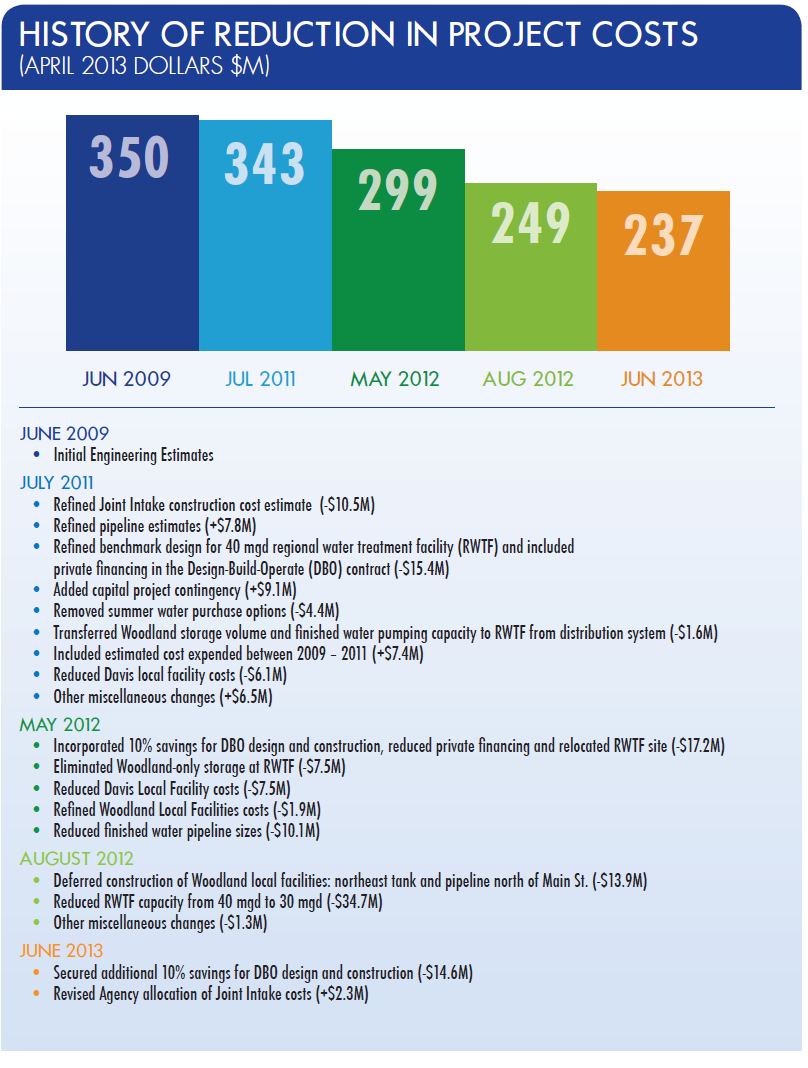 The issue of the surface water projects and the cost to the community has long been a point of contention. The Woodland-Davis Clean Water Agency put together a one-page information sheet on the Project Cost Estimate and the history on how the costs have been reduced.
The issue of the surface water projects and the cost to the community has long been a point of contention. The Woodland-Davis Clean Water Agency put together a one-page information sheet on the Project Cost Estimate and the history on how the costs have been reduced.
This is somewhat incomplete as the current costs do not reflect any cost increases caused by the increase in the cost of municipal bonds as the result of the lawsuit and possible initiative that could undo the Prop 218 approved water rates.
On the other hand, it is instructive to note that the costs from June 2009 to July 2011 were essentially the same. It is only once the water referendum occurred in October 2011 and the city and agency analyzed costs and ways to reduce the costs that the costs fell from $343 million to $237 million project-wide.
This graphic can help the public understand how and why the costs went down. While some of the cost reduction is due to the reduction in the capacity from 40 mgd to 30 mgd, that only accounts for $34.7 million of the $106 million in total savings, or about one third.


Nice!
[quote]This is somewhat incomplete as the current costs do not reflect any cost increases caused by the increase in the cost of municipal bonds as the result of the lawsuit and possible initiative that could undo the Prop 218 approved water rates.[/quote]
I’d like an accounting on this.
The yield on the Power Shares Build America Bond Fund is up 0.3% since October 2011 adding about $700,000 a year in interest costs on an amount of $234 million. This assumes we would get comparable rates. Of course the trend in interest rates is up so further delay probably will increase the additional interest expense.
By the time we are done with the water plant, it should be much cheaper, and those decreases in costs will far outweigh whatever bond cost increases there might be.
Mike – This is unsupported by any evidence. Prove your theory, with supporting documentation and calculations.
Not at this time, Ryan.
Then don’t make the claim.
I would like periodic updates from the City on how much your actions are costing us and have that figured into the overall cost of the project. If your lawsuit and referendum is making the project cheaper, as you claim, then we should be able to see the numbers clearly. If it is not, then we should know the damage.
How many hours you have in Mike? How much an hour do you plan on getting from the City?
Ryan Kelly said . . .
[i]”I would like periodic updates from the City on how much your actions are costing us and have that figured into the overall cost of the project. If your lawsuit and referendum is making the project cheaper, as you claim, then we should be able to see the numbers clearly. If it is not, then we should know the damage.”[/i]
Ryan, I probably disagree with Michael more often than I agree with him, but it isn’t his actions that are costing us. It is the actions by the City that are costing us. Michael didn’t make the decision to go with a water rate structure that changes horses in midstream, the City did. Michael didn’t throw a tantrum and raise holy hell about CBFR when the public record of the WAC was full of testimony by Frank Loge and Matt Williams showing that a traditional meter-based rate structure was not compliant with the proportionality provisions of Proposition 218. Bob Dunning threw that tantrum and raised holy hell. Michael didn’t receive a rate recommendation from the WAC and then disregard it, the City did. Michael didn’t receive a rate recommendation from Doug Dove of Bartle Wells and Kelly Salt of Best, Best and Krieger and then disregard it, the City did.
The law is the law. Michael did have a simple choice, we could have chosen to ignore the law, or he could have chosen to uphold the law. He chose the latter. His motives may not be ones that you or I agree with, but the legal ground he stands on are solid as a rock.
He’s claiming that suing the City will make the project cost less. If it will, have him prove it. He had a choice of action. He chose to sue us. We are “the City.” We are paying to defend ourselves, we are paying for higher interest rates due to his choice to sue us.
Ryan, you make a series of good points. I will agree with you that Michael’s motivations for the suit are broader than the legal basis for the suit. That doesn’t change the fact that the City by its actions created the legal basis for the suit. Michael’s motivations would have been useless to him in a court if he didn’t have a legal argument.
Also, lets be clear your first sentence should actually say “He’s claiming that suing the City will make the surface water project disappear.” If the project does disappear then there is no question that the project will cost less. With no surface water project your argument about paying for higher interest rates also goes away.
So the only way it will cost less is for the project to go away and the money we pay to defend ourselves and pay an anticipated settlement will be less than if we went ahead with voter approved plans.
However, that’s not what he’s claiming. He states, …
“By the time we are done with the water plant, it should be much cheaper, and those decreases in costs will far outweigh whatever bond cost increases there might be.”
Must I assume that he is disingenuous?
If your definition of “disingenuous” includes “being incomplete in his communication” then my answer is “yes.” If your definition doesn’t include incompleteness then my answer would be “partially.”
When I look at at any communication from Michael, I put it into the context of the whole body of his communications. As a result I discount any communication from him that allows for the possibility that Davis will participate in the surface water plant.
But again, all of that is incidental to the fact that the City has handed him a straight forward legal case on a silver platter. He won’t win all of his causes of action, but under the provisions of Proposition 218 law, all he has to do is win one of the water related causes of action in order to have the water rate structure declared unConstitutional. The wastewater causes of actions are separate and distinct from the water causes of action.
I think both you and I agree that everything that Michael does has an element of theater in it. After all, when any lawyer is arguing in court before a judge and/or a jury, that lawyer is on stage.
And the center of attention.
8>)
Law is law which can’t be change for anyone, and should be followed by everyone. asp chart ([url]http://www.koolchart.com[/url])